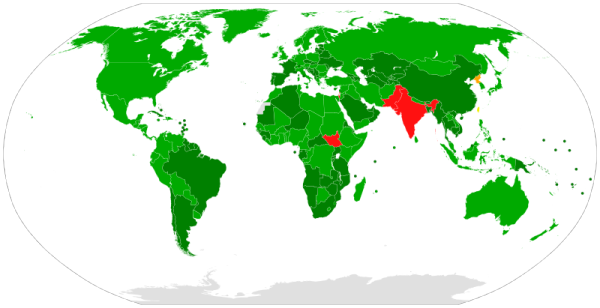On Monday 22nd April, the NPT prepcom started in Geneva and will last for two weeks. The Prepcom is part of the five-yearly cycle of meetings to review the nuclear non-proliferation treaty. Every day Reaching Critical Will produce a newsletter full of analysis, commentary and information for delegates and NGO representatives who are in Geneva. This article is the editorial for Wednesday 24th of April. Written by Ray Acheson who we interviewed last week.
Outside of the Assembly Hall, delegates from the nuclear weapon states say that they recognize the humanitarian and environmental devastation caused by the use of nuclear weapons. They say that these consequences are so well known there is no longer any point in discussing them. In public, they say nothing. The interventions delivered by the five recognized NPT nuclear weapon states on Monday did not include any references to this topic. However, the majority of other delegations do want to talk about it, not least because it is the most realistic way to address nuclear weapons.
While possessors or those sheltering under nuclear alliances prefer to discuss their weapons in the abstract, as “deterrents” or as instruments of “national security,” the rest of us see these weapons for what they really are: instruments of death, destruction, manipulation, injustice. This is why 127 governments came to Oslo, Norway in early March. Following on from the discussion that began in Oslo, countless delegations at this PrepCom have expressed concern with the catastrophic humanitarian impact of nuclear weapons. A joint statement is being prepared on this subject as well. “We cannot approach nuclear weapons through a strategy of denial,” argued Norwegian Ambassador Kongstad. “As long as the probability of a nuclear weapons detonation exists… it must be a humanitarian concern.” Likewise, Ambassador Otachi of Kenya argued that the policy of nuclear “deterrence” is the equivalent of threatening mass extinction.
Yet this basic understanding of the risks of nuclear weapons seems to have evaporated from the consciousness of those possessing the weapons. In its opening address, the US delegation relayed US Secretary of State John Kerry’s comment that the NPT was “conceived in a different era when the hands of the Doomsday Clock pointed precariously towards disaster.” Yet the Doomsday Clock, which was set at 7 minutes to midnight in 1968 when the NPT was negotiated, now sits at 5 minutes to midnight.
The Bulletin of Atomic Scientists, which maintains the clock, explained that one of the biggest reasons for moving the clock closer to midnight in 2012 was the lack of progress on nuclear disarmament. Over the last two days, many governments have expressed their disappointment and frustration with this lack of tangible progress on nuclear disarmament. The delegations of Brazil and Ireland argued that while the NPT’s non-proliferation provisions have successfully prevented acquisition of nuclear weapons, the treaty’s disarmament provision has not achieved its objective.
However, Ambassador Guerreiro of Brazil expressed confidence that the nuclear weapon states “will sooner or later” realize that it is in their security interest to live in a world free of nuclear weapons.
Unfortunately, 65 years after the first nuclear weapon test, those who possess nuclear weapons do not seem to have reached this conclusion. They seem more convinced than ever that nuclear weapons protect their interests. UK prime minister David Cameron’s response to the Democratic People’s Republic of Korea’s recent nuclear weapon test was to emphasize the need for retaining its arsenal, arguing it would be “foolish to leave Britain defenceless”.
In contrast, Ireland’s Ambassador Corr argued, “Progress on disarmament would remove any possible perceived incentive for a State to respond to a nuclear weapons capability by developing its own retaliatory capability.” He called on the nuclear weapon states to instead engage in bilateral and multilateral negotiations for elimination of their arsenals. And, as Malaysian Ambassador Haniff noted, waiting on the nuclear weapon states to fulfill their commitments does not preclude us from pursuing nuclear disarmament. The majority of the world’s citizens, as well as the majority of their governments, believe that nuclear weapons bring insecurity, not protection.
It’s time to reject the strategy of denial and take concrete action now to address this threat once and for all.










